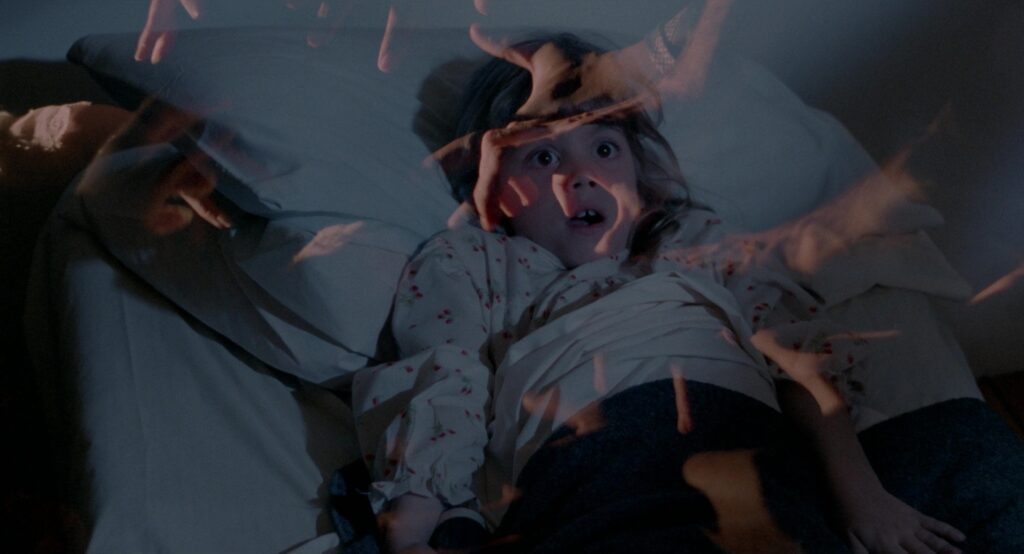
Cathy (Christine Moore) was terrorized and abused as a child by her mother. In a fit of rage, Cathy’s mother stabbed her father to death. This trauma plagues Cathy well into adulthood, even after she meets her fiancé Bob (Gary Warner). As their wedding draws nearer Cathy’s childhood comes into sharper focus as uncanny incidents begin to occur all around her. Then one night Bob takes Cathy to a party where she comes to the shocking realization that she’s been under the control of a satanic cult for almost her entire life.
Lurkers (1988), Roberta Findlay’s horror film about trauma, evokes the post-punk milieu of the Transgressive film movement. Near the surprising twist ending Findlay stages a series of kinky tableaus in rapid succession as Cathy tries to escape a satanic cult. This brief sequence of bondage gear and stark, high contrast compositions is indicative of the fundamental paradox at the heart of Lurkers; Roberta Findlay is a greater stylist than her modest budget will allow.
That isn’t to say that Lurkers isn’t affective as a lurid spectacle of relived trauma. There are just certain technical limitations at work in the film that may render it as somewhat less accessible to those unfamiliar with either underground films or straight to video entertainments of the time. For example, the dialogue, in how it is written and how it is performed, would easily feel at home in a pornographic film. On a similar note, the obligatory sex scenes overstay their welcome; their mere presence undermines Findlay’s carefully paced escalation of suspense.
The hook of the movie, the part that will draw a viewer in, happens fairly early on when Cathy is but a child. Reading under her bed sheets, dreaming of escaping her cruel mother, Cathy is visited by strange specters that come out of her wall. Findlay adorns these evil spirits as grotesques but not as the kind of boogey man monsters one might expect. Instead these demonic apparitions look like exactly what it is that frightens children the most: elderly strangers, the sick and the dying. Findlay throws the viewer into the deep end of childhood horror and imagination. Admittedly the special effect looks cheap and dated, but it is still highly affective and evocative.
Lurkers, aside from addressing the issues facing a woman living with severe trauma, deals with the “satanic panic” that swept the United States in the eighties. The Rosemary’s Baby (1968) inspired climax of Lurkers connects the contemporary hysteria and paranoia surrounding satanism to the national trauma brought about by the Manson family some twenty years earlier. The misdirection in Lurkers that all of these supernatural occurrences exist only in Cathy’s mind, manifested by the cavalcade of fantastic tableaus mentioned above, seems to draw on The Shining (1980) in a very similar way.
What’s scary about Lurkers isn’t its intertextuality with Rosemary’s Baby, The Shining, or the Transgressive cinema movement nor the images of violence; but the manipulation that Cathy is a victim of. Since her mother died when she was ten, Cathy’s entire life has been controlled and manipulated by this satanic cult. Throughout the film Bob denies Cathy any legitimization of her emotions. He denies her herself in any way that could possibly empower her to escape the grasp of his satanic cult. The immediacy and relevancy of this mode of terror cannot be downplayed. It serves as the grim counterbalance to the more obvious images of child abuse that populate the first half of the film.
Roberta Findlay is a real auteur of the straight to video, latter days of grindhouse cinema. Her distinctly female perspective works through these rather sleazy and lurid genres in compelling ways that reveal an artist who isn’t stymied by budget constraints. Her films, including Lurkers, may not be monuments of high art, but they are artful, engaging exercises in genre picture making. Findlay is one of those filmmakers that proves the adaptability and fluidity of genres that for too long have been assumed to be the sole province of male directors.
